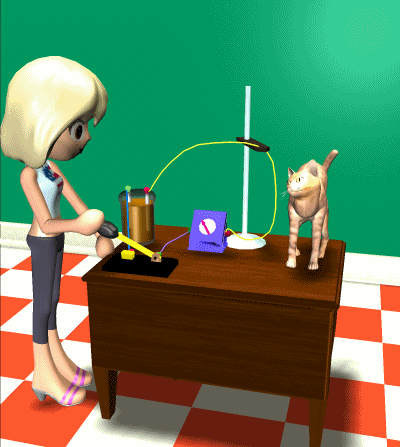Sunday, October 09, 2005
Electoral engineering

In any form of engineering or technical work, it's important to find the right output, and then adjust your system to optimize that output.
Here we have several things happening, but Polistra is properly focusing on the effect of the static charge on the cat's fur, not on the motion of the switch handle, her elbow, or the meter needle. All of those actions may be interesting (especially if her joints are aching from constant repetition of the experiment) but she will adjust her setup to produce the desired hair-raising, regardless of the other moving parts.
One big problem with our current political setup is that presidents and their advisors have learned to focus tightly on a handful of votes in two or three states. Dick Morris and Karl Rove are both expert electoral engineers. Rove designed the pointless and counterproductive Medicare Prescription Drug plan to swing the meter needle of a few Palm Beach widows, after determining that they were the critical point in the election. So the rest of us have to spend billions of dollars for a plan that nobody wanted and nobody will actually use. Since Rove had obviously identified those few voters, it would have been far cheaper to simply bribe them.
What would happen if presidents focused on the cat instead of the meter?
How would things be different if they could declare their vision for America, and try to charge up voters in all corners of the nation, not just Palm Beach and Cincinnati? We'll never know in a large sense, because at this point both parties are so devoted to watching those tiny wiggles of the meter that each falsely believes the other will gain the advantage if the system changes. Wrong. Consider 2000. It's true that simply switching to the popular vote at the last moment would have handed the election to Gore. But it's not that simple. If the rules were based on popular vote from the start, parties and candidates would behave differently. There's no way to predict how that election would have come out if both parties had been aiming for a popular majority through the entire campaign.
We may get temporary relief from electoral engineering if Karl Rove is forced out of power.
I'm wondering if Bush's latest speech, in which he finally pulled back the Zen curtain and condescended to feed us a few actual morsels of information, shows the start of a de-engineered presidency. Will this trend continue after Rove leaves? I don't know, but I do think it would be good for the country. At any rate we'll have an interesting experiment.....

In any form of engineering or technical work, it's important to find the right output, and then adjust your system to optimize that output.
Here we have several things happening, but Polistra is properly focusing on the effect of the static charge on the cat's fur, not on the motion of the switch handle, her elbow, or the meter needle. All of those actions may be interesting (especially if her joints are aching from constant repetition of the experiment) but she will adjust her setup to produce the desired hair-raising, regardless of the other moving parts.
One big problem with our current political setup is that presidents and their advisors have learned to focus tightly on a handful of votes in two or three states. Dick Morris and Karl Rove are both expert electoral engineers. Rove designed the pointless and counterproductive Medicare Prescription Drug plan to swing the meter needle of a few Palm Beach widows, after determining that they were the critical point in the election. So the rest of us have to spend billions of dollars for a plan that nobody wanted and nobody will actually use. Since Rove had obviously identified those few voters, it would have been far cheaper to simply bribe them.
What would happen if presidents focused on the cat instead of the meter?
How would things be different if they could declare their vision for America, and try to charge up voters in all corners of the nation, not just Palm Beach and Cincinnati? We'll never know in a large sense, because at this point both parties are so devoted to watching those tiny wiggles of the meter that each falsely believes the other will gain the advantage if the system changes. Wrong. Consider 2000. It's true that simply switching to the popular vote at the last moment would have handed the election to Gore. But it's not that simple. If the rules were based on popular vote from the start, parties and candidates would behave differently. There's no way to predict how that election would have come out if both parties had been aiming for a popular majority through the entire campaign.
We may get temporary relief from electoral engineering if Karl Rove is forced out of power.
I'm wondering if Bush's latest speech, in which he finally pulled back the Zen curtain and condescended to feed us a few actual morsels of information, shows the start of a de-engineered presidency. Will this trend continue after Rove leaves? I don't know, but I do think it would be good for the country. At any rate we'll have an interesting experiment.....
